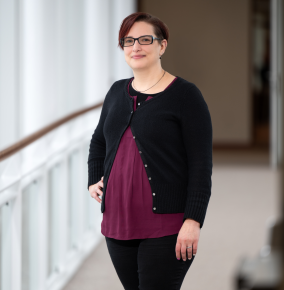Jess Alekseyev

What kinds of projects are you working on at the Laboratory?
One area of focus in my group, Bioanalytics Systems and Technologies, is on transforming organizations by modernizing their data handling processes to enable reuse, with a focus on AI-readiness. I work on leveraging user concerns, both at the individual and data ecosystem level, to drive the execution of these kinds of projects. This involves understanding end users — e.g. who are they, what tools do they have now, what are their pain points, etc. —as well as current capabilities and gaps in available technology. We then use what we've learned to build a roadmap tailored to that organization.
How has your career evolved at the Laboratory?
I have had a unique path through the Laboratory — starting as a visual designer in our creative department and then getting an MS degree in human factors and moving into a technical group to apply that new perspective. A lot of the Laboratory's sponsors rely on end users to tell them whether the technology we are researching and building is viable for their organization. Understanding these users and their expertise, and then incorporating that understanding into our work, is key for their acceptance of new advanced technology.
What do you find rewarding about working here?
Any project that makes it out into the world and has impact is for sure rewarding, and all projects help to improve my understanding of how we can best meet the needs of our intended end users. One project that has left its mark on me was for the United States Transportation Command where we were trying to transition a decision support aide, but were struggling with user acceptance.
After sitting with the intended end users and learning the details of their existing processes, we were able to develop a better way forward for our application. Deepening our user understanding allowed us to successfully transition the tool without any code changes, UI or otherwise. The impact of understanding your users' needs, and speaking their language, shouldn't be underestimated. It's a lesson I carry with me on all projects.
Do you have any advice for someone seeking to work in your field?
Be curious, and always start with the assumption that there is a reason why people are doing things the way that they are. There are a number of resources out there, from blog entries to full MS degree programs, that focus on formal user experience and human factors investigation methods for those who want to dive deep. But the first step is to understand who your users are and what they want.
Start by talking to users — observe them and their work environment, let them train you if they will allow it. Get as close to their work as you can, and be thoughtful about the changes you're proposing.